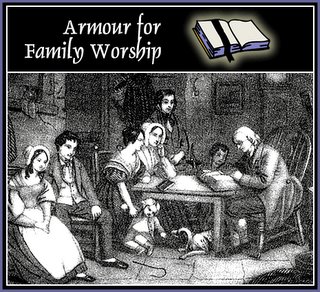 This is a post that I feel very compelled to write. Its importance is of such a level that I will probably include it in my “Rules for this Weblog” page. But before I get into the main substance of this post, let me first say that this weblog (The Armoury) has been a helpful tool for a number of reasons. First, it is a helpful resource for me as a pastor because it enables me (with ease) to provide Scriptural lessons for our flock on a regular basis – the lessons of greatest importance I post on our calendar and e-mail to our members – this has been very helpful. Second, in all my time spent reading and researching, I find that this weblog has become a personal resource that I use to store important current events (secular and religious) to use at the appropriate time, whether on this blog or in my preaching – or most likely in both. By itself, this has become one of the greatest advantages. Third, it has opened a door to meeting other like minded brethren who I would love to meet in person someday – I am refreshed to hear about others who love the Lord and His people, and have a great desire to see the lost come to Christ. Fourth, it has provided an opportunity to spread the seed of God’s Word to those who do not know Christ. There have been only a few such opportunities thus far, but if only one were converted through this weblog ministry then I can assure you, that it would be important enough; even all of Heaven would rejoice over such a work of God (Luke 15:3-7)!
This is a post that I feel very compelled to write. Its importance is of such a level that I will probably include it in my “Rules for this Weblog” page. But before I get into the main substance of this post, let me first say that this weblog (The Armoury) has been a helpful tool for a number of reasons. First, it is a helpful resource for me as a pastor because it enables me (with ease) to provide Scriptural lessons for our flock on a regular basis – the lessons of greatest importance I post on our calendar and e-mail to our members – this has been very helpful. Second, in all my time spent reading and researching, I find that this weblog has become a personal resource that I use to store important current events (secular and religious) to use at the appropriate time, whether on this blog or in my preaching – or most likely in both. By itself, this has become one of the greatest advantages. Third, it has opened a door to meeting other like minded brethren who I would love to meet in person someday – I am refreshed to hear about others who love the Lord and His people, and have a great desire to see the lost come to Christ. Fourth, it has provided an opportunity to spread the seed of God’s Word to those who do not know Christ. There have been only a few such opportunities thus far, but if only one were converted through this weblog ministry then I can assure you, that it would be important enough; even all of Heaven would rejoice over such a work of God (Luke 15:3-7)!
So while I can say that this “weblog” forum is a helpful one, I must also say that there are a lot of potholes out there on the internet. On the one hand, there are a number of weblogs that are honoring Christ and bearing a Christian testimony – for this I am thankful to the Lord; but on the other hand, there are some weblogs that frankly taint the testimony of Christ through bitter argumentation, unwholesome words and even a callous approach to the lost. The kind of autonomy that the internet gives us as individuals has produced a kind of virtual fellowship that is devoid of any oversight. In a very distant sense, it is even like a church that is without godly elders. To some extent, it smacks of the Corinthian problem, because many in that church there were doing what they believed was right in their own eyes, and the lack of godly leadership there only nurtured further chaos and recklessness. What I see as a modern trend is the perpetuation of ungodly blogging, that is to say, e-conversations which seem to lack the charity, grace, maturity, humility and sobriety that is consistent with Christian discipleship – and it is not excusable simply because “it is the way of most blogs.” The electronic venue itself offers no excuse for believers whatsoever. I can’t blame my keyboard, nor my computer, for making posts which spew pugnacity, arrogance and pride: computers are mindless machines – they only produce what we humans give them. This post is an open letter that is designed to give a word of encouragement and a word of rebuke wherever it is needed. Concurrently, it is offered up as a warning to myself, lest I might degrade into the kinds of conversations which bring shame to the fair name of Christ.
After monitoring the activities of several popular blogs, I have become concerned that a casual attitude is being fostered in the manner in which believers speak with one another, and with the lost. I have even seen instances in which non-Christians have been treated with very little grace and compassion. In one particular case, a non-Christian entered into a rather unfortunate rant on a Christian blog and in frustration queried if this is what it means to be a Christian. When I read this, it grieved my spirit – Is this how brethren want to manifest the glory of Christ in this world? But in addition to my own sense of grief, I couldn’t help but to consider the wonderful value of this man’s question. His question was worthy of a very serious answer – but instead, he was only mocked for what he had to say.
I mention this man’s circumstance (his is one of several examples that I could have mentioned) because his question is really the reason for this post. It is sad when the non-Christian community can see our weaknesses better than we do ourselves. In the following paragraphs I will offer a series of thoughts that have to do with godly discourse – among brethren and within this world. The Scriptures have a great deal to say about our words – so much so, that we must remember that these principles don’t cease to exist once our fingertips make contact with our keyboards, and therefore, they should impact every aspect of our interactions with brethren and unbelievers – no matter what venue we converse in:
1. In America we have many freedoms, but as Christians our freedoms are established by a very different standard: Here is a first principle that is very broad and far reaching. It is one that I believe is crucial for “American Christianity” since it seems that in the United States, our sense of patriotism can become confused very quickly. We are very thankful for our many freedoms that we have in this nation, however, we must measure our use of those freedoms very carefully. In the matter of the internet and weblogs, it is important for us all to be careful about the liberties that we take in our posts. Here in America, we are free to do and say just about anything – however, as Christians, we need to be careful to use our freedom responsibly:
1 Peter 2:16 Act as free men, and do not use your freedom as a covering for evil, but use it as bondslaves of God.
From the standpoint of American law we all have a great deal of freedom to say just about anything that we would like to – however, this is not the ultimate standard for the believer. Our freedoms need to be measured by the greatest of all standards – the standard of Christ; therefore we must carefully measure our words in view of our privileged position as the bondslaves of God.
2. This is the WORLD WIDE WEB, not your private living room: Weblog dialogues are not private conversations – they are public conversations which are being conducted on the World Wide Web. Because of this, we should keep in mind that a very wide variety of people are constantly listening in on what we are saying (typing):
1 Peter 2:12 Keep your behavior excellent among the Gentiles, so that in the thing in which they slander you as evildoers, they may on account of your good deeds, as they observe them, glorify God in the day of visitation.
Peter is not calling us to some false form of showmanship, rather he is reminding us that unbelievers are constantly watching us because we are in the world. Therefore, our words and actions ought to be a continual form of evangelism such that they might see the fruit of the Spirit in us: love, joy, peace, patience, kindness, goodness, faithfulness, gentleness, self-control; rather than the deeds of the flesh, which include outbursts of anger, disputes, dissensions and factions.
3. Self control includes our tongues: One of the greatest diseases within the church is the uncontrolled tongue. Like a small rudder and flame, the words spoken by our tongue can foster great ungodliness and corruption (James 3:4-6) if it is not used for edification and encouragement (Ephesians 4:29). It is too easy to become reckless with our words and thereby wreak havoc by our speech, rather than offering godly encouragement or a discerning rebuke. Proverbs 10:19 reminds us of our frailty in this matter:
Proverbs 10:19 “When there are many words, transgression is unavoidable, but he who restrains his lips is wise.”
By these principles, let us be reminded that restraint, moderation and wisdom are always a good standard for any conversation, whether conducted in person or in cyberspace.
4. Some conversations must be held in private – period: Clearly, if a brother has sinned with his words, our response must be measured carefully in view of Matthew 18:15:
Matthew 18:15 “And if your brother sins, go and reprove him in private; if he listens to you, you have won your brother.
Christ says, literally – metaxu sou kai autou monou (between you and him alone). If an offense has taken place between two brethren, then they ought to give careful consideration to settling the matter in private rather than in public. In this world of communications technology, it amazes me that the blog-world has nearly replaced the telephone, e-mail or personal discourse – important forms of private communication. While blogging might be easier, that doesn’t make it the better form of communication in all contexts. But not only is private discourse important in times of conflict, it is also a matter of wisdom and self control to privatize our conversations for the sake of accurately conveying our motives and intentions to those with whom we speak. John, the Apostle of love, applied this himself:
3 John 13 I had many things to write to you, but I am not willing to write them to you with pen and ink; 14 but I hope to see you shortly, and we shall speak face to face (See also 2 John 12).
What John wanted to say, he desired to say to their faces. Both pen and ink are very important – this is the historic manner in which the Lord has revealed His precious Word to us – however, in dealing with personal relationships, we ought to be able to discern the relative value of public notices versus private counsel.
5. Some conversations (blogs) ought to be avoided altogether: We must all remember that when we participate in a blog discussion, we become the willing participants of that conversation. Whether a public or private conversation, we have to consider whether we want to be associated with such a discussion or not. Paul warned Timothy that there will be some conversations that should not be dignified through personal involvement, but must be shunned and sometimes rebuked:
2 Timothy 2:23 But refuse foolish and ignorant speculations, knowing that they produce quarrels. 24 And the Lord’s bond-servant must not be quarrelsome, but be kind to all…
Titus 3:9 But shun foolish controversies and genealogies and strife and disputes about the Law; for they are unprofitable and worthless.
By participating in conversations that are “unprofitable and worthless” we, either knowingly or haplessly, fuel the very fires that should be otherwise snuffed out:
Proverbs 26:21 Like charcoal to hot embers and wood to fire, So is a contentious man to kindle strife.
Let us, therefore, pick our conversations carefully and with the Lord’s wisdom above all. If you find that you are in the midst of a discussion that is becoming unprofitable, then bow out. If everyone applied this principle, then many unfruitful conversations would simply die out through a lack of fuel.
6. The testimony of brotherly love: The love of the brethren is a great part of our testimony to the world that we are the disciples of Christ:
John 13:35 “By this all men will know that you are My disciples, if you have love for one another.”
When brethren manifest the sweet aroma of grace, patience and love for one another – they manifest the very image and likeness of Christ Himself; but when we engage in name calling with one another, then we evidence great foolishness – or in the worst of all cases, a disingenuous faith:
Matthew 5:21-22: 21 “You have heard that the ancients were told, ‘You shall not commit murder’ and ‘Whoever commits murder shall be liable to the court.’ 22 “But I say to you that everyone who is angry with his brother shall be guilty before the court; and whoever shall say to his brother, ‘Raca,’ shall be guilty before the supreme court; and whoever shall say, ‘You fool,’ shall be guilty enough to go into the fiery hell.”
The word “Raca” comes from the Aramaic word reyka’ which can be translated as “idiot, blockhead, numskull, or even fool.” And the word “fool” comes from the word moros (from which we get the word moron) and is a strong synonym to raca. Both terms speak of a person who is disdainful, whether by ignorance or by volitional foolishness. In either case, the Savior called these hateful terms. By this text, we should understand that believers must be warned about calling other brethren such names. If you’re tempted to do so, it is time to take a blogger’s time out & pray for grace and humility to do much better than this.
7. The testimony of faithfulness and truthfulness: Paul, as we all know, was accused by the Corinthians of being a hypocrite. They charged that he was a kind of chameleon who was willing to write things that he couldn’t back up in person. But Paul rebuked this charge in the following manner:
2 Corinthians 10:11 “Let such a person consider this, that what we are in word by letters when absent, such persons we are also in deed when present.”
Paul was a man of great consistency and faithfulness. What he was in letter, he was in person – in other words, he wasn’t a two-faced man. When believers place their fingers on the keyboard, they ought to consider what they are about to type and ask themselves this question: “would I be willing to say these same things in person?” If you wouldn’t be willing to make such remarks to someone’s face, then put a lid on it.
8. As the advocates of sovereign grace, we should be a most gracious people: Let me not say anything here – the text speaks for itself –
Ephesians 4:25-27, 29-32: 25 Therefore, laying aside falsehood, speak truth, each one of you, with his neighbor, for we are members of one another. 26 Be angry, and yet do not sin; do not let the sun go down on your anger, 27 and do not give the devil an opportunity…29 Let no unwholesome word proceed from your mouth, but only such a word as is good for edification according to the need of the moment, that it may give grace to those who hear. 30 And do not grieve the Holy Spirit of God, by whom you were sealed for the day of redemption. 31 Let all bitterness and wrath and anger and clamor and slander be put away from you, along with all malice. 32 And be kind to one another, tender-hearted, forgiving each other, just as God in Christ also has forgiven you.
Conclusion: To the brethren reading this, let me encourage you to think very carefully about these principles from Scripture; as the little children’s song goes: “O be careful little hands what you do.” Perhaps we could revise the words in this way – “O be careful little hands what you type…” I can assure you that at the moment our fingers touch the keyboard, the principles of Scripture do not change – because they never change. There is indeed a time and a place for public rebukes – but we ought to be very sober and serious minded when doing so. Biblical errorists should be rebuked, but when such a need arises, we ought to be humble and very grave about the matter. Finally, to those who are reading this who are not Christians, let me say this: if you find yourself at a blog that names the name of Christ, but that seems to be many miles away from the above principles, then let me encourage you to move along to something else. The folks at such a blog may be having a bad day (yes, Christians sin – we’d be fools to deny it, 1 John 1:8), or you may have come to a place that only names the name of Christ, but has nothing to do with Christianity. In either case, let me encourage you to find a blog which is practicing the above principles – at a place like that, I would be more confident that you would get what you truly need.



 and lack of love for the Lord Himself. Every such encounter of Christian’s is a profitable learning experience and reminder to us all: we all will meet many people who claim to be followers of the Good Shepherd, but who refuse to heed His gracious call. In one such case, Pilgrim was approaching the Valley of the Shadow of Death when he met two men along the pathway:
and lack of love for the Lord Himself. Every such encounter of Christian’s is a profitable learning experience and reminder to us all: we all will meet many people who claim to be followers of the Good Shepherd, but who refuse to heed His gracious call. In one such case, Pilgrim was approaching the Valley of the Shadow of Death when he met two men along the pathway: In this last post for The Quest for Biblical Blogging I wish to address the very touchy subjects of humor, sarcasm and strong language; at least to the extent that I might be able to in a short weblog post! Let me say that with every post on The Armoury I continue to think about how deep these biblical subjects are and how they could all warrant a complete book, rather than a short post; thus, I fear that I will only graze the surface of what is a very deep subject, but something is better than nothing. I do think that this is another important spoke in the wheel of biblical communication, and it is especially needful in a culture that nearly worships comedy and entertainment. To get to this subject, I believe that I need to say a few preliminary things:
In this last post for The Quest for Biblical Blogging I wish to address the very touchy subjects of humor, sarcasm and strong language; at least to the extent that I might be able to in a short weblog post! Let me say that with every post on The Armoury I continue to think about how deep these biblical subjects are and how they could all warrant a complete book, rather than a short post; thus, I fear that I will only graze the surface of what is a very deep subject, but something is better than nothing. I do think that this is another important spoke in the wheel of biblical communication, and it is especially needful in a culture that nearly worships comedy and entertainment. To get to this subject, I believe that I need to say a few preliminary things: Elijah’s, Paul’s and especially Christ’s legacy of communication is not that of a standup comedian, but of great sobriety and serious mindedness. The reality of such godliness is reflected in that scene given to us by John Bunyan, in Pilgrim’s Progress, when Christian saw in Interpreter’s house the portrait of a godly pastor – seven key descriptions are supplied:
Elijah’s, Paul’s and especially Christ’s legacy of communication is not that of a standup comedian, but of great sobriety and serious mindedness. The reality of such godliness is reflected in that scene given to us by John Bunyan, in Pilgrim’s Progress, when Christian saw in Interpreter’s house the portrait of a godly pastor – seven key descriptions are supplied:



 The following article will appear (Lord willing) in the
The following article will appear (Lord willing) in the 


